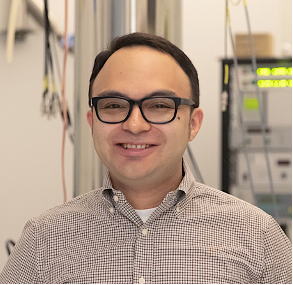 The harnessing and manipulation of electronic states in quantum materials has the potential to revolutionize computation, sensing, storage, and communications, thus impacting multiple facets of our everyday lives. In this talk I will discuss my group’s recent experiments with monolayer graphene (MLG), Bernal stacked bilayer graphene (BLG), and trilayer graphene (TLG), highly versatile carbon-based quantum materials with electronic properties that are promising for future quantum technologies.
The harnessing and manipulation of electronic states in quantum materials has the potential to revolutionize computation, sensing, storage, and communications, thus impacting multiple facets of our everyday lives. In this talk I will discuss my group’s recent experiments with monolayer graphene (MLG), Bernal stacked bilayer graphene (BLG), and trilayer graphene (TLG), highly versatile carbon-based quantum materials with electronic properties that are promising for future quantum technologies.
Specifically, I will focus on a set of experiments that utilize confinement, nanoscale visualization, and spectroscopy to reveal new properties of the surface states hosted by graphene based electronic devices. In one experiment, we use the scanning tunneling microscope to corral charges in MLG and then subject these charges to a perpendicular magnetic field. This enables the observation of a giant orbital Zeeman splitting for trapped ultra-relativistic electrons in our MLG devices, which can be leveraged for magnetic field sensing. In a second experiment, BLG charges are trapped and scanning tunneling microscopy is used to visualize the wavefunctions and quantum interference of these trapped charges. Thus, in this work we “look under the hood” of a potential quantum information processing material platform. Finally, in a third experiment, we use atomically resolved point spectroscopy to measure a giant and tunable magnetic moment for the charges in TLG devices. The results from these three experiments advance fundamental understanding of carbon-based quantum material devices towards their use for future quantum technologies.
Related Link:
Biosketch:
Jairo Velasco Jr. is an Associate Professor of Physics at the University of California Santa Cruz. His research interests include the study of electronic properties and structure of 2D materials. He received his PhD in physics from the University of California Riverside in 2012 with Jeanie Lau. He was then a President’s Postdoctoral Fellow in Mike Crommie’s group in the Department of Physics at the University of California Berkeley from 2012-2015. Dr. Velasco is also a recipient of the NSF early CAREER award.